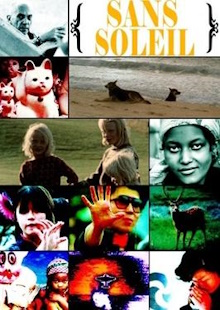This French film is usually considered a documentary and indeed, some call it one of the greatest documentaries of all time. I think it’s more like an experimental art film and even its maker Chris Marker calls it a home movie that others somehow are willing to pay to watch. It consists of both footage that Marker shot himself along with stock footage from others. There’s a lot going on in the extensive narration but some key themes include the impermanence of memory and imbuing meaning through rituals. I’m not convinced that there is anything truly deep in it though. I rather think of it as a carefully constructed puzzle box, meant to pleasingly tickle your mind as the film guides you into making strange, unexpected connections.
The film opens with a single frame that the narrator calls the purest expression of happiness possible, showing three girls walking across a field. From there, it jumps to scenes from many places including Japan, Guinea-Bissau, Iceland and San Francisco. The narration purports to be a series of letters sent by someone named Sandor Krasna but in reality they are actually all written by Marker himself. It ranges freely across a bewildering array of themes and topics, but often comes back to memory and meaning. I also detect a deep fascination for Japan as seen from a foreigner’s point of view which I would attribute to the country’s prominence as an economic and cultural power in the 1980s. The footage borrowed from others include weird effects such as applying a video synthesizer to process images of protests and warfare, an extensive retracing of the places where Hitchcock’s Vertigo was shot, the shockingly gruesome sight of a giraffe being killed and so on. The intent behind including all these elements seem perplexing at first but Marker has a talent in making pleasing callbacks to them later.
Even compared to other experimental films, this is exceptionally difficult to make sense of. Yet it is still abundantly clear that this is no random assortment of images and commentary, haphazardly thrown together. It’s aesthetically pleasing for one thing and the commentary smoothly segues from one topic to another in a way that feels philosophically deep. I’m not convinced that it’s actually profound as opposed to merely offering the illusion of it. It reminds me of the famous Secret of Psalm 46 talk by Brian Moriarty, specifically the sections that cover why conspiracy thinking is fun and how it is possible to imbue meaning into practically anything by linking them in just the right way. This film pulls this maneuver again and again, dropping the image of the three girls at the beginning only to bring it up again towards the end; using the name tora, the Japanese word for tiger, in multiple ways. It feels symmetrical, bringing about a pleasing sense of completion, even if at the end it doesn’t mean that much.
Apart from any deeper meaning, I’m confident that Marker’s fascination for Japan shines through strongly here, particularly in how they seem to have small, quirky rituals for just about everything. He even dives into videogames, cites Pac-Man as a metaphor for the cycle of life, and even the strange video synthesizing technique comes from Japan. It feels a bit dated as this was very much a phenomenon of the 1980s when Japan was still new and exotic to Westerners. I still appreciated it as a nostalgic trip and I liked how it also exposes some of less salubrious aspects of the country, including drunk Koreans in the streets and far-right politicians demagoguing in the streets. The sections about African countries resonated less with me. It’s a painfully true observation that so many African revolutionary movements, once they gain power, devolve into despotic regimes themselves. Yet this is so large and important a point that it feels like it should belong in another film entirely.
I added this to my list because of its reputation but I don’t think this deserves to be considered a great film. It’s clever in many ways but there are no deep truths to be found here. It’s all technique and editing and I’d much prefer documentaries that are grounded in particular subjects.
